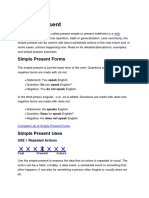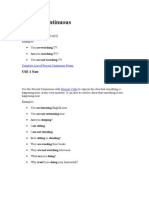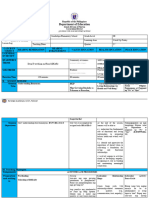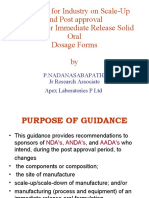B1 Section 1 Explanations
B1 Section 1 Explanations
Uploaded by
Caio AlvesCopyright:
Available Formats
B1 Section 1 Explanations
B1 Section 1 Explanations
Uploaded by
Caio AlvesOriginal Title
Copyright
Available Formats
Share this document
Did you find this document useful?
Is this content inappropriate?
Copyright:
Available Formats
B1 Section 1 Explanations
B1 Section 1 Explanations
Uploaded by
Caio AlvesCopyright:
Available Formats
Contents
Present Simple with 'Do' for Emphasis ................................................................................................. 3
The Present Continuous for Habits in the Present ................................................................................. 4
The Past Simple and Would with 'Wish' ............................................................................................... 5
The Past Simple for Past Habits and States ........................................................................................... 6
The Past Simple for Ordering Actions .................................................................................................. 7
2 Ultimate B1 Grammar Course Section 1
Present Simple with 'Do' for Emphasis
Of course, we use 'do' and 'does' in questions and negatives in the present simple.
• Does she like chocolate?
• I don't live here.
However, we can sometimes also use 'do' and 'does' in normal, positive sentences in the present
simple. This is called using 'do' for emphasis. We use it when we want to tell people that they are
wrong!
• A: Jane doesn't live in Paris.
• B: That's not true. She does live in Paris.
We use it with imperatives. This makes them stronger but it's quite polite.
• Do sit down.
• Do have some cake!
We use it just to make the present simple stronger.
• I like coffee. (This is normal.)
• I do like coffee. (This means I really like coffee.)
3 Ultimate B1 Grammar Course Section 1
The Present Continuous for Habits in the Present
We can use the present continuous to talk about habits that are not regular. Instead these habits
happen often but at irregular times. Usually we need 'always', 'forever' or 'constantly'.
• She's forever losing her keys.
• He's always smiling.
• The car is constantly breaking down.
• My mother is always bringing us little treats.
Sometimes this use includes the idea that something happens too often, so the sentence has a negative
or annoyed feeling. But this isn't always true. 'He's always smiling' is positive. Notice the difference
with habits in the present simple. The present simple is neutral emotionally, and often suggests that
the habits happen at regular times.
• I drink coffee every morning (present simple - completely neutral sentence).
• He's constantly drinking coffee (present continuous - suggests he drinks too much coffee).
It's important to remember that we can often choose the present simple or present continuous to talk
about the same habit. Both are correct but we choose depending on how we feel about the habit and
depending on which adverb (always / forever / constantly / usually / often, etc) we use.
4 Ultimate B1 Grammar Course Section 1
The Past Simple and Would with 'Wish'
When we use 'wish' to talk about the present, we usually use it with the past simple. This is similar to
the way that we use the past simple in the second conditional to talk about unreal things in the present.
• I wish (that) I had a bigger house!
• I wish (that) the weather was better!
• I wish (that) you were here.
We often drop 'that' after 'wish'. It's correct both ways. We can also use 'wish + would + infinitive' to
talk about things that we don't like in the present. We use 'would' when we are talking about someone
else's behaviour that we want to change. It's often blaming the other person a little bit for doing
something we don't like.
• I wish (that) he would stop smoking!
• I wish (that) the children wouldn't watch so much TV.
• I wish (that) she wouldn't complain all the time.
Often, it's fine to use either 'wish + past simple' or 'wish + would'. 'Wish + past simple' doesn't give us
the feeling of blame – it's just a fact.
• I wish (that) she didn't complain all the time.
Sometimes, we imagine that something like our car or our computer or the weather has feelings and
behaviour that we'd like to change!
• I wish (that) it wouldn't rain so much!
• I wish (that) my car would start easily.
• I wish (that) my computer wouldn't crash so often.
5 Ultimate B1 Grammar Course Section 1
The Past Simple for Past Habits and States
Of course, we can use the past simple to talk about one action that happened in the past. But we can
also use the past simple to talk about states and habits (or repeated actions) in the past. We can use the
past simple to talk about a state in the past (often with a stative verb).
• He was very slim when he was a child.
• We had a red car in the 1990s.
• In the Stone Age, people had stone tools.
• I liked sweets in the past, but I don't like them now.
We can also use 'used to + infinitive' to talk about states in the past. The meaning is very similar to the
past simple. With 'used to' we don't need to make it clear when the state existed. We can use the past
simple to talk about repeated actions or habits in the past.
• I drove to work when I lived in the countryside.
• She swam every day in the 1980s.
• In the past, many people rode horses.
• We picked strawberries every summer when I was young.
We can also use 'would + infinitive' and 'used to + infinitive' to talk about habits in the past. The
meanings are very similar to the past simple.
6 Ultimate B1 Grammar Course Section 1
The Past Simple for Ordering Actions
We can use the past simple to say that one thing happened before another thing. In this case, normally
the first action that we say is the one that happened first. This is important to be clear about, because
it's not true when we start talking about the past continuous and the past perfect. We can also drop the
subject if it doesn't change.
• I went home and had dinner. (This means that first I went home and then second I had
dinner.)
• She rented a car and drove to the beach.
• He called us and we went to pick him up.
• They met and they fell in love.
We can also use the past simple to talk about things that happened at the same time or more or less the
same time.
• I studied French and I enjoyed it.
• He cycled and his dog ran beside him.
• James watched TV and Julie read a book.
• I cooked and chatted.
7 Ultimate B1 Grammar Course Section 1
You might also like
- TOEIC Grammar Guide: 22 Grammar Rules You Must Know To Pass The TOEIC Exam!From EverandTOEIC Grammar Guide: 22 Grammar Rules You Must Know To Pass The TOEIC Exam!Rating: 3.5 out of 5 stars3.5/5 (15)
- Drilling Facilities: NORSOK Standard D-001Document70 pagesDrilling Facilities: NORSOK Standard D-001Well Control100% (2)
- Used To Do and Be Used To DoingDocument4 pagesUsed To Do and Be Used To DoingMarekNo ratings yet
- Top Mistakes at A2Document6 pagesTop Mistakes at A2zexa228sanya229No ratings yet
- Grammar 3Document123 pagesGrammar 3Enrico SocoNo ratings yet
- Used To vs. Use To: Common Mistakes in EnglishDocument8 pagesUsed To vs. Use To: Common Mistakes in EnglishEduardo Chávez DuránNo ratings yet
- Used To Do and Be Used To Doing PDFDocument4 pagesUsed To Do and Be Used To Doing PDFDaniel Andres Perez TamayoNo ratings yet
- A2 Online (Tuesday)Document12 pagesA2 Online (Tuesday)Berke BulunurNo ratings yet
- Resumen Gramática Índice de ContenidoDocument17 pagesResumen Gramática Índice de ContenidoKarlson2009No ratings yet
- Used To Get Used To To Be Used To Doing and WouldDocument24 pagesUsed To Get Used To To Be Used To Doing and WouldJorge FerreiraNo ratings yet
- 3B Articles: A An The No ArticleDocument6 pages3B Articles: A An The No Articlebrenda ochoaNo ratings yet
- Past Habit - Used To/would/past SimpleDocument4 pagesPast Habit - Used To/would/past SimpleUna BeronjaNo ratings yet
- English On Line CourseDocument13 pagesEnglish On Line CourseDaniela Frediani RezendeNo ratings yet
- B1 Grammar Lessons and Exercises: Present Simple Vs Present Continuous - FormDocument100 pagesB1 Grammar Lessons and Exercises: Present Simple Vs Present Continuous - FormEmilio Mendez DominguezNo ratings yet
- 2 - TenseDocument24 pages2 - TenseHaibat Sultan StationeryNo ratings yet
- Gramática Del InglésDocument12 pagesGramática Del InglésLuis Enrique Ramirez PadillaNo ratings yet
- EnglishDocument38 pagesEnglishMrs. NobodyNo ratings yet
- WouldDocument3 pagesWouldthuthuy5588No ratings yet
- Clasa A VIII A B 4.05.2020 Present TensesDocument7 pagesClasa A VIII A B 4.05.2020 Present TensesLiliana GheorgheNo ratings yet
- Be and Get Used ToDocument1 pageBe and Get Used ToMaripinkyNo ratings yet
- Simple Present: Do You Speak English?Document15 pagesSimple Present: Do You Speak English?Pedro CostaNo ratings yet
- Used To Meaning and Form: Sibela EminovićDocument13 pagesUsed To Meaning and Form: Sibela EminovićAndjela TomovicNo ratings yet
- Past TensesDocument6 pagesPast TensesScarlettSamanthaAragonNo ratings yet
- Present TensesDocument16 pagesPresent TensesAziz LmiknassiNo ratings yet
- Modal VerbsDocument9 pagesModal VerbsIsaiasNo ratings yet
- Outcomes 3rd Edition: Upper Intermediate grammar sectionDocument24 pagesOutcomes 3rd Edition: Upper Intermediate grammar sectionValentyna HordiienkoNo ratings yet
- Present Continuous: Are You Watching TV?Document36 pagesPresent Continuous: Are You Watching TV?kamaloufNo ratings yet
- Simple Past Vs Past Continuous Tense (1) - 231023 - 140832Document17 pagesSimple Past Vs Past Continuous Tense (1) - 231023 - 140832captaindear75No ratings yet
- Present Simple or ContinuousDocument5 pagesPresent Simple or ContinuousAlfonso JaénNo ratings yet
- The Simple Present TenseDocument15 pagesThe Simple Present TenseangelNo ratings yet
- Conditionals: When IfDocument8 pagesConditionals: When Ifmilicavasilic5720No ratings yet
- JoshSkill 1729643555533Document9 pagesJoshSkill 1729643555533webityaNo ratings yet
- Lower Intermediate 2Document79 pagesLower Intermediate 2kamehouseNo ratings yet
- Grammar WeekDocument13 pagesGrammar Weekmintintlu13No ratings yet
- W1 - L2 - Present Continuous - Present Simple - Comparison of Present Continuous and Present Simple - State Verbs and Actions VerbsDocument18 pagesW1 - L2 - Present Continuous - Present Simple - Comparison of Present Continuous and Present Simple - State Verbs and Actions VerbsRANA ALI HASSANNo ratings yet
- Future in EnglishDocument7 pagesFuture in EnglishCarlos RodríguezNo ratings yet
- Past ContinuousDocument3 pagesPast Continuousbaljeet KaurNo ratings yet
- Used To GrammarDocument3 pagesUsed To GrammarJean Carlo Paulino0% (1)
- Present Simple ContinDocument28 pagesPresent Simple ContinMariaNo ratings yet
- Future TensesDocument16 pagesFuture Tenses1912922No ratings yet
- Simple TenseDocument28 pagesSimple TenseNeo SauRouNo ratings yet
- BBC Learning EnglishDocument99 pagesBBC Learning Englishshanthimam38100% (2)
- Direct To FCE Grammar ReferenceDocument19 pagesDirect To FCE Grammar ReferenceDolores Salguero González100% (3)
- Review of TensesDocument17 pagesReview of TensesStefany Serret Trejo100% (1)
- Adverbs of FrequencyDocument6 pagesAdverbs of FrequencyagatuliaNo ratings yet
- Uses of LikeDocument14 pagesUses of LikeadauNo ratings yet
- Past Simple Past ContinuousDocument13 pagesPast Simple Past ContinuousbiffinNo ratings yet
- BBC Learning English - Towards AdvancedDocument16 pagesBBC Learning English - Towards AdvancedGabriel BorgesNo ratings yet
- Affirmative Negative Interrogative: S S S Doesn't Doesn't Doesn't Does Does DoesDocument24 pagesAffirmative Negative Interrogative: S S S Doesn't Doesn't Doesn't Does Does DoesKayallvilly SabapathyNo ratings yet
- Grammar FocusDocument35 pagesGrammar FocusTrabajos AcadémicosNo ratings yet
- RepasoDocument11 pagesRepasoMatias NicolasNo ratings yet
- The 10 Ways To Use Would: To Make Polite RequestsDocument7 pagesThe 10 Ways To Use Would: To Make Polite RequestsMohammad AseemNo ratings yet
- Simple Present TenseDocument14 pagesSimple Present TenseSINDI 222151070No ratings yet
- What's The Difference Present Simple & Present ContinuousDocument20 pagesWhat's The Difference Present Simple & Present ContinuousP Ananda SariNo ratings yet
- Modals & Auxiliary VerbsDocument5 pagesModals & Auxiliary VerbsKahnMéndezNo ratings yet
- Modals Part 1 GroupDocument26 pagesModals Part 1 GroupMchmmd ArNo ratings yet
- English TensesDocument9 pagesEnglish TensesPaulo MarquesNo ratings yet
- Active / Passive Verb FormsDocument37 pagesActive / Passive Verb FormshusnaNo ratings yet
- English Verb Tenses: Practice and Speak Like a NativeFrom EverandEnglish Verb Tenses: Practice and Speak Like a NativeRating: 5 out of 5 stars5/5 (1)
- Fossil Evidence of Evolution Guided Notes Part 1Document5 pagesFossil Evidence of Evolution Guided Notes Part 1tileshadowNo ratings yet
- Synplify Synthesis Faq PDFDocument19 pagesSynplify Synthesis Faq PDFmiulius13No ratings yet
- An Internship Report On HR Policies of An Educational Institution Focusing On Glory School & CollegeDocument51 pagesAn Internship Report On HR Policies of An Educational Institution Focusing On Glory School & CollegeSandeep SinghNo ratings yet
- AJP Chapter 1 PPT - Event Handlers and ListenersDocument23 pagesAJP Chapter 1 PPT - Event Handlers and ListenersAjrocksreallyNo ratings yet
- Chapter 8 - Between-Subjects DesignDocument17 pagesChapter 8 - Between-Subjects DesignSumendra RathoreNo ratings yet
- Elcometer 406LDocument29 pagesElcometer 406LGabriel CamposNo ratings yet
- TABLE B - Employment by Major Industry Group and Total Hours Worked, Philippines - 2Document6 pagesTABLE B - Employment by Major Industry Group and Total Hours Worked, Philippines - 2cotiadanielNo ratings yet
- Flocabulary Thesis VideoDocument8 pagesFlocabulary Thesis Videotammymitchellfortwayne100% (2)
- Sustainable Development Vocabulary 2nd BacDocument1 pageSustainable Development Vocabulary 2nd BacAmine YaàcoubiNo ratings yet
- Ai Fitness Trainer Using Human Pose Estimation IJERTCONV11IS08017Document8 pagesAi Fitness Trainer Using Human Pose Estimation IJERTCONV11IS08017Sparsh SharmaNo ratings yet
- Economics of Tobacco in India - A Barrier in Curbing The Silent Epidemic A Comprehensive ReviewDocument7 pagesEconomics of Tobacco in India - A Barrier in Curbing The Silent Epidemic A Comprehensive ReviewInternational Journal of Innovative Science and Research TechnologyNo ratings yet
- Web CruiterDocument2 pagesWeb CruiterTina VeljkovicNo ratings yet
- Exam Practice: Short Answer Type Questions (3 Marks Each)Document7 pagesExam Practice: Short Answer Type Questions (3 Marks Each)abiNo ratings yet
- Modern Diesel Engine Concepts PDFDocument6 pagesModern Diesel Engine Concepts PDFBelghennou Hadj AliNo ratings yet
- Bailey Python BookDocument325 pagesBailey Python Bookhardworking_studentNo ratings yet
- Heinemannetal HydrogenStorageinSalineAquifersDocument27 pagesHeinemannetal HydrogenStorageinSalineAquiferssara ahmadiNo ratings yet
- 2 2002 Barkaukas Concrete Contruction ManualDocument294 pages2 2002 Barkaukas Concrete Contruction ManualpelinNo ratings yet
- Talent Acquisition Ebook US v3 1Document10 pagesTalent Acquisition Ebook US v3 1hrd cave sumber berkat 3No ratings yet
- DLL Catch Up EnglishDocument9 pagesDLL Catch Up EnglishJoan MalinaoNo ratings yet
- Bugtong, Trixie Jael P.Document10 pagesBugtong, Trixie Jael P.yeng botzNo ratings yet
- Terasaki Technical Guide - Very ImportantDocument12 pagesTerasaki Technical Guide - Very ImportantSreekanth RaveendranNo ratings yet
- DH-Robotics Grippers Catalog - 201906Document6 pagesDH-Robotics Grippers Catalog - 201906zhnlsn36522No ratings yet
- Functional Dependencies and Normalization For Relational DatabasesDocument54 pagesFunctional Dependencies and Normalization For Relational Databasesmerhatsidik melkeNo ratings yet
- Law of Attraction ExcerptDocument11 pagesLaw of Attraction Excerptdmg123100% (1)
- Dissertation Sur La Constitution de 1791Document6 pagesDissertation Sur La Constitution de 1791PayingSomeoneToWriteAPaperJackson100% (1)
- Immediate Release Solid Oral SUPACDocument37 pagesImmediate Release Solid Oral SUPACnadanasabapathiNo ratings yet
- Lesson Plan - Roofs Layout, Design, and Editing Lesson OverviewDocument34 pagesLesson Plan - Roofs Layout, Design, and Editing Lesson OverviewHabeebMohammedFarooqNo ratings yet
- Fundamentals of Nursing Practice: de Jesus, M.BDocument12 pagesFundamentals of Nursing Practice: de Jesus, M.BBetina De Jesus0% (1)
- C++ Lab ExercisesDocument8 pagesC++ Lab ExercisesSeravana KumarNo ratings yet

























































































